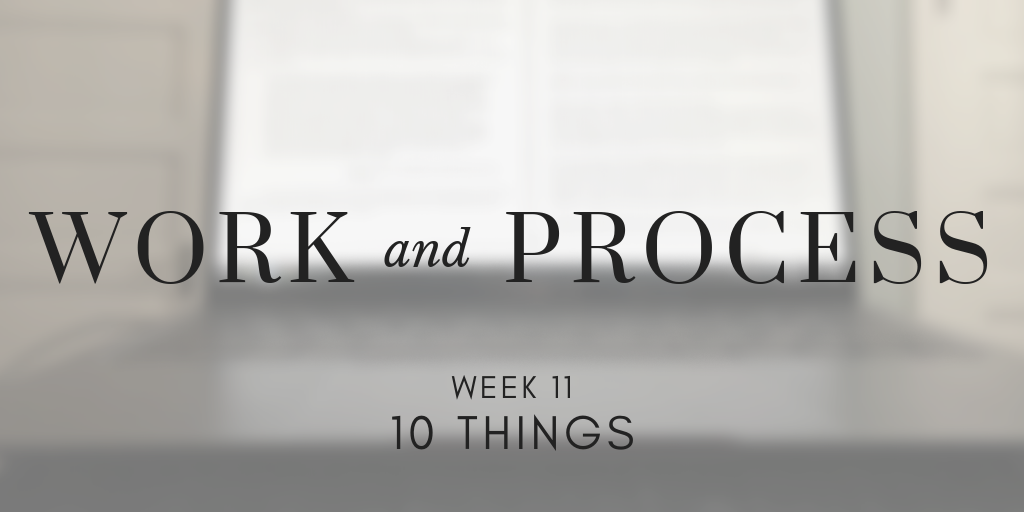|
Sometimes at events, I get asked what I do when I have writer’s block, and I tell them I have two answers: one helpful and one totally unhelpful. The unhelpful answer is that I don’t get writer’s block anymore, or at least I haven’t gotten it in the past five to ten years. The helpful answer, however, is that one of the reasons I don’t get writer’s block anymore is because I’ve accumulated so many tips and tricks over the years I’ve been studying writing that whenever I’m faced with the blank page, I have a tool to help me deal with whatever is stymying me at the time. An exercise. A map. A craft book. Something.
I do think writer’s block is real, and I don’t think it necessarily has to do with how many tips and tricks you have or how long you’ve been doing this or how skilled you are, but perhaps with any number of other factors, including emotional, psychological, or situational ones. But as I haven't experienced this for a very long time, I don't think I'm quite the right person or in quite the right place to discuss it here. I can, however, share some of the tricks I use when I’m stuck on a scene, or a chapter, or a character, when I’m having trouble figuring out what comes next, what turn to take, or how to approach something. I wish I could remember where I discovered this tool so I could credit it properly, but if anyone knows, please let me know (I’m on Twitter, Instagram, Tumblr, and Facebook) so I can edit this post! This is one of those easy tricks. No need for charts or graphs. Just a blank space and something to write with. And when you’re stuck, just make a list of 10 things. 10 things your character could do in this situation. 10 things they could be feeling. 10 motivations they might have. 10 potential sources of conflict. 10 places this scene could go. Start with whatever comes to mind. Usually, these are the most obvious answers and the easiest ones to come up with. Let’s say your character needs to get into a locked building. How are they going to do it? They could: 1) bribe someone to open it for them, 2) steal the keys, 3) break a window… But once you’ve exhausted the obvious, it gets more difficult… and more interesting. They could: 4) come in through the sewer, 5) jam the door while someone else is opening it, 6) fake a heart attack to distract the guard, allowing their compatriots to enter… And by the time you’re near the end, you start to really stretch your imagination, coming up with wild or even irrational possibilities. They could: 7) buy the building and demolish one of its walls, 8) impersonate a guard or other person who has access to the building, 9) hire a lockpick who might very well double-cross them… The goal of this exercise is to exhaust the boring, uninspired possibilities of a particular problem and to challenge yourself to come up with something unexpected or nuanced or compelling that you wouldn’t have otherwise thought of. Not all of your answers have to be workable. In general, 1-3 will be unimaginative, and 8-10 will be preposterous, but this is, I think, a good thing. Because giving yourself the freedom to write down all the outlandish things that could happen allows you to stumble inadvertently upon the things that are believable or interesting or surprising, often somewhere between 4-7, that will help you get unstuck. I use this trick all the time. It’s great for when I’m not sure what would happen next, or when I’m unclear about what a character is feeling at a pivotal moment, or how to clamber over some narrative obstacle I’ve set up for myself. It gets me out of my own head, and it gets me thinking beyond things that have to make sense to things that could feel right or true for the story. And whenever I’m done with my list, I always have something new to try, and even if I don’t end up going with one of my 10 things, I’ve started writing again, and that’s a win. Next week: FELLOWSHIP. I had such a blast at Emerald City Comic Con this weekend, meeting readers and hanging out with fellow writers, and I can't stop thinking about the importance of friendship! Let’s be in this together next Sunday at tracichee.com and/or post your own responses with the hashtag #workandprocess. Enjoy yourself. <3 Work and Process is a year-long journey of exploring and reflecting on the artistic process, craft, and working in a creative field. Each Sunday, I’ll post some thoughts, wonderings, explanations, and explorations on writing and creativity, and by the end of it, I hope to have 52 musings, examinations, meanderings, discoveries, bits of joy or inquisitiveness or knowledge to share. In each post, I’ll also include a topic for the following week, so if you happen to be inspired to question/wonder at/consider your own work and process, you’re welcome to join me. We’ll be using the #workandprocess hashtag across all social media platforms, and I hope we find each other to learn and connect and transform on our creative wanderings. Comments are closed.
|
ARCHIVES
February 2024
CATEGORIES |


 RSS Feed
RSS Feed